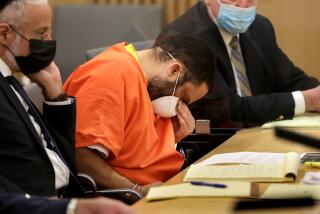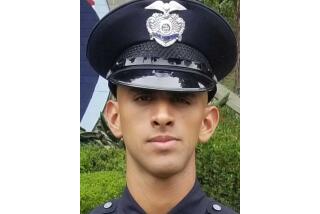LAPD Officer Gets 5 Years for Shooting Driver
Saying police displayed “gross abuse of authority,” a Superior Court judge sentenced a suspended Los Angeles Police Department officer to five years in state prison Monday for shooting an unarmed motorist during a dispute over a traffic citation.
Judge William R. Pounders said Ronald Orosco, 32, and his partner “were wrong from the start” in a series of events last year that included Orosco’s shooting Charles Beatty, 66, four times in the back.
For the record:
12:00 a.m. Oct. 31, 2001 FOR THE RECORD
Los Angeles Times Wednesday October 31, 2001 Home Edition Part A Part A Page 2 A2 Desk 1 inches; 32 words Type of Material: Correction
Officer’s sentencing--A story Tuesday incorrectly reported that Los Angeles Police Officer Ronald Orosco shot a motorist four times in the back. He shot him once. The other three shots hit the car but did not hit the motorist.
Beatty, a retired aerospace worker, survived, but he still carries a bullet near his spine.
Orosco, who originally pleaded not guilty, agreed two months ago to plead no contest to a felony charge of shooting into an occupied vehicle.
He faced six months to seven years in prison.
Pounders accepted the sentencing recommendations of Deputy Dist. Attys. John Gilligan and Hector Guzman.
After pronouncing sentence, Pounders ordered the bailiffs to take Orosco into custody.
Orosco, who had been on the force five years at the time of the shooting, broke into tears as he embraced his sobbing wife and his mother.
“I hope you are satisfied,” an Orosco relative yelled at Gilligan and Guzman.
Orosco had been indicted on charges of assault with a deadly weapon and firing into an occupied vehicle.
In exchange for the no-contest plea, prosecutors dropped the assault charge.
Without the plea agreement, he could have received 25 years to life in prison if convicted.
The shooting happened June 14, 2000, at Central and Florence avenues.
Orosco and his partner, Gorgonio Medina, working in plain clothes and in an unmarked car, were stopped at a traffic light, talking to a transient.
After waiting through two or three signal changes, Beatty pulled around them and made a left turn, unaware that Orosco and Medina were police officers.
When the officers issued a ticket for that maneuver, Beatty complained.
Beatty admittedly became belligerent, prosecutors said.
But he complied with the officers’ orders, accepted the ticket and got into his car to leave.
At that point, according to prosecutors, Beatty said something that prompted another exchange of angry words.
Orosco became vehement when Beatty told him he “would see him in court,” Beatty testified. Beatty said Orosco was using abusive language toward him.
Beatty said that one officer grabbed his arm and tried to pull him out of the car and that he saw Orosco pull out his weapon.
He said he fled out of fear.
Orosco shot through the driver’s rear side window from 2 feet away, hitting Beatty in the back, prosecutors said.
He then fired three more shots, the last from about 50 feet away. Medina did not fire his weapon.
“I did nothing to officers Orosco and Medina except argue about their methods and the way they treat people,” Beatty said in court.
“I believe we’re in a day when these kinds of things will not be swept under the rug.”
Prosecutors said Orosco shot Beatty out of anger, when Beatty became verbally abusive and tried to drive away.
Orosco’s lawyer, William Hadden, disputed that claim Monday, saying his client fired his gun because he was afraid for his life.
He said that Orosco made a bad decision and that he cried about the shooting.
Hadden called about a half dozen friends and police officers to tell the court that Orosco was a good officer who had never lost his temper in their presence.
In explaining the sentence, Pounders said, “the officers were the ones making matters worse. . . . Any citizen would have been outraged.”
More to Read
Sign up for Essential California
The most important California stories and recommendations in your inbox every morning.
You may occasionally receive promotional content from the Los Angeles Times.










